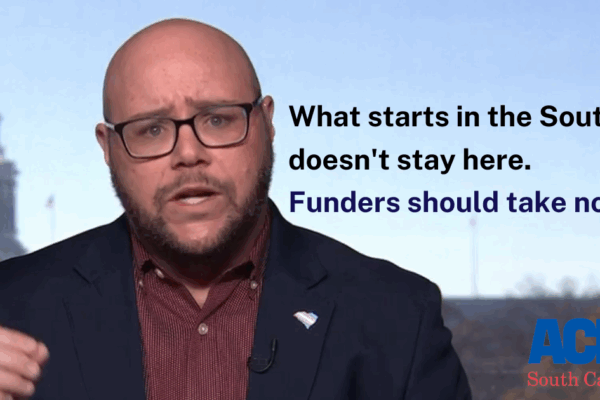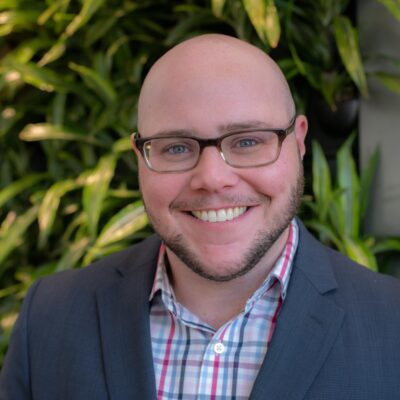The United States’ 47th President is Donald Trump.
Since his inauguration, I’ve experienced countless emotions. I’ve been heartbroken. I’ve been scared. I’ve been angry.
In the time since President Trump’s victory, I’ve talked to dozens of South Carolinians about how they’re feeling. I’ve heard people worry for their immigrant neighbors. Many have expressed fear about the right to free speech for political dissenters. Folks are kept up at night thinking about the continued attacks on the reproductive rights of their kids and grandkids.
I was there too. But despair isn’t a plan; it’s a call to action. I had to look at myself in the mirror and ask, “What are you going to do about it?”
The answer: fight like hell. Because that’s what the ACLU does. We’ve been around for 105 years; we’ve survived 19 Presidents; we’ve been led by civil rights leaders who faced unspeakable challenges, and we stand on their shoulders as we face what comes now.
I know fighting back isn’t going to be easy. But the ACLU is stronger than it’s ever been. We have more than 2,200 staff across the country—including a South Carolina team that’s more than doubled since Trump’s first term. Together, we will meet this moment with the fervor it demands.
Here in South Carolina, extreme forces aligned with Trump have been threatening our freedoms for years. We have been at the tip of the spear of some of the most draconian attacks on civil rights and civil liberties. The South Carolina legislature has banned abortion at six weeks, stripped healthcare from transgender people, and brought back the death penalty. In individual communities, local policymakers have removed books from libraries and folded religion into public schools. Extremists are being voted into offices at every level, guaranteed victory by gerrymandered electoral maps.
Because we’ve been living under extremist leadership, we have a lot of experience in blocking attacks on civil rights and civil liberties. These successes often fly under the radar—but what we’ve been able to stop is notable.
- In nearly every state in the Southeast, lawmakers have followed the far-right playbook to ban accurate teaching about racism in classrooms—we've kept a similar bill from passing.
- Many states have prohibited diversity, equity, and inclusion (DEI) initiatives in education and business—we’ve blocked those attempts.
- Some states have banned drag performances or passed "don't say gay" laws, removing any reference to LGBTQ people in government—not South Carolina.
These bad ideas from our lawmakers, and countless other dangerous policies, come back year after year, so it can be easy to forget to pause for a moment and celebrate that we haven’t let this harm come to pass. Some of our supporters are surprised that we’ve been able to stop these proposals in a state controlled by far-right extremists, a state that receives far less attention than our neighbors, a state that too often feels forgotten.
We’re meeting these relentless attacks at the ACLU of South Carolina by focusing on three strategic pillars:
- Advocacy & Organizing: Mobilizing grassroots power to influence policy and build public support for justice.
- Litigation: Serving as a last line of defense against laws and policies that harm South Carolinians.
- Public Education: Raising awareness about hidden legislative actions and empowering communities to advocate for their rights.
In the years ahead, this work is going to be more important than ever.
Far-right politicians will continue their attempts to roll back reproductive freedom. They’ll try to force religion into public education. They’ll scapegoat immigrants in our communities. And the South – home to the highest numbers of Black Americans, queer Americans, first-generation Americans, and immigrant communities – will be at the vanguard of these attacks, as it always has been.
But just as our forebears rose up to fight poll taxes, Jim Crow, and restrictions on everything from their bodies to who they loved, so will we. Those trying to drive us back will have to get through all of us first.
It’s going to take South Carolinians to save South Carolina. It’s going to take Southerners to save the South. It’s going to take funders and donors to commit to a long-term vision for change that doesn’t leave our region behind.
Deep South states like South Carolina have been under-resourced, under-mobilized, and overly discounted. It’s time for funders and donors to ask why, to evaluate their giving patterns, to reconsider their game plans, and to dedicate themselves to fixing that imbalance.
What happens here may start here, but we’ve seen time and again that it doesn’t stay here. We can and must do better this time; together, we can create a just South Carolina where “We the People” means all of us. But it’s going to take just that—all of us.
I hope I can count on you.


